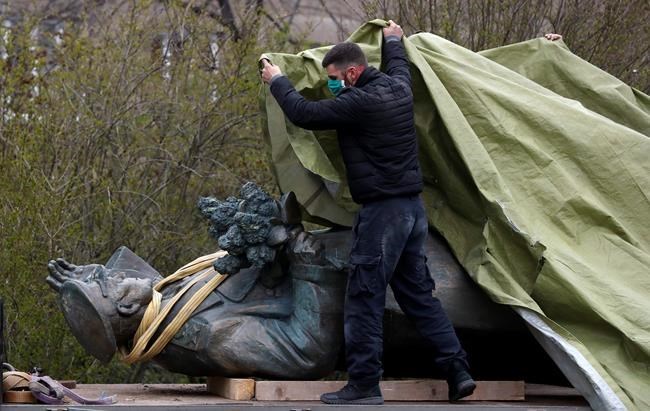
FILE - In this file photo taken on Friday, April 3, 2020, a worker covers the statue of a Soviet World War II commander Marshall Ivan Stepanovic Konev for removal from its site in Prague, Czech Republic. Relations between the Czech Republic and Russia have taken a turn for the worse in a series of disputes over the interpretation of historical events. Three Prague politicians whose recent actions upset Russia have been placed under police protection amid a media report that Russian intelligence services have been plotting to poison them with the deadly toxin ricin. Russia has opened a criminal investigation into Prague's removal of a war memorial to a World War II hero, among other actions that have tested diplomatic ties. (AP Photo/Petr David Josek/File)
Republished June 05, 2020 - 10:04 AM
Original Publication Date June 05, 2020 - 6:46 AM
PRAGUE, Czech Republic - The Czech Republic’s spy agency has discovered that a diplomat from the Russian Embassy in Prague spread false information about a Russian assassin arriving to allegedly target the Czech capital’s mayors, Prime Minister Andrej Babis said Friday.
Babis said the findings of the counter-intelligence agency known as BIS clearly show “that the whole case was a result of an infighting between the staffers at the Russian Federation Embassy in Prague.”
“One of them sent to our counter-intelligence service false information about a planned attack against Czech politicians,” he said.
Babis said the action further complicated Czech-Russian relations. Czech authorities took all necessary measures, and two Russian diplomats at the embassy were declared persona non grata and expelled, he said.
“We have an interest in having good relations with all countries, but we’re a sovereign state and such actions on our territory are unacceptable,” the prime minister said.
The Russian Foreign Ministry warned in a statement that “Prague’s actions will not only draw a response in kind, but also will be taken into account in shaping the Russian policy toward the Czech Republic.”
“By taking that unfriendly step, the Czech side has acted indecently and unworthily,” the Russian ministry said. “The Czech authorities have inflicted a serious damage to the Russian-Czech relations without any reason whatsoever. It will be necessary to respond to such provocations.”
The alleged assassination plot surfaced in April when the investigative Respekt weekly magazine reported that Czech intelligence services suspected that a Russian who arrived in Prague on a diplomatic passport was sent to poison Prague Mayor Zdenek Hrib and Prague 6 district mayor Ondrej Kolar with ricin, a potent toxin derived from castor beans.
The story was based on anonymous sources. The Czech Foreign Ministry only confirmed that a Russian diplomat arrived in Prague in March.
The Russian Embassy protested at the time, calling the allegations baseless and designed to discredit Russia. The Czech Foreign Ministry responded that it was inappropriate for a foreign state to question basic rights such as freedom of the press.
Kolar, Hrib and the mayor of Prague’s Reporyje district, Pavel Novotny, all consequently received police protection.
Russian Foreign Minister Sergey Lavrov ridiculed the claims published in the magazine, saying that the notion that Czech authorities spotted a Russian man equipped with ricin and let him through didn't make sense.
Czech officials didn’t comment in April but Kolar said in a television interview that he was under police protection because of “some facts that have been found, the fact that there’s a Russian here whose goal is to liquidate me.”
He added that the alleged assassin was also targeting Hrib and Pavel Novotny, the mayor of Prague’s Reporyje district.
The three had been involved in actions that previously angered Russia.
In February, a Prague square in front of the Russian Embassy was renamed after slain Russian opposition leader Boris Nemtsov, with Hrib unveiling the new nameplate.
In April, Kolar’s district removed a statue of Soviet World War II commander Ivan Stepanovic Konev, whose armies completed the liberation of Prague from Nazi occupation.
The statue’s removal caused outrage in Russia, which has angrily lashed out at any attempts to diminish the nation’s decisive role in defeating the Nazis.
Novotny provoked Moscow’s ire with plans to build a monument to the soldiers of Gen. Andrei Vlasov’s army. Over 300 of them died when they helped the Czech uprising against Nazi rule and contributed to Prague’s liberation. Their role is controversial for Russia, however, because they previously fought against the Red Army alongside Nazi troops.
___
Vladimir Isachenkov in Moscow contributed to this report.
News from © The Associated Press, 2020